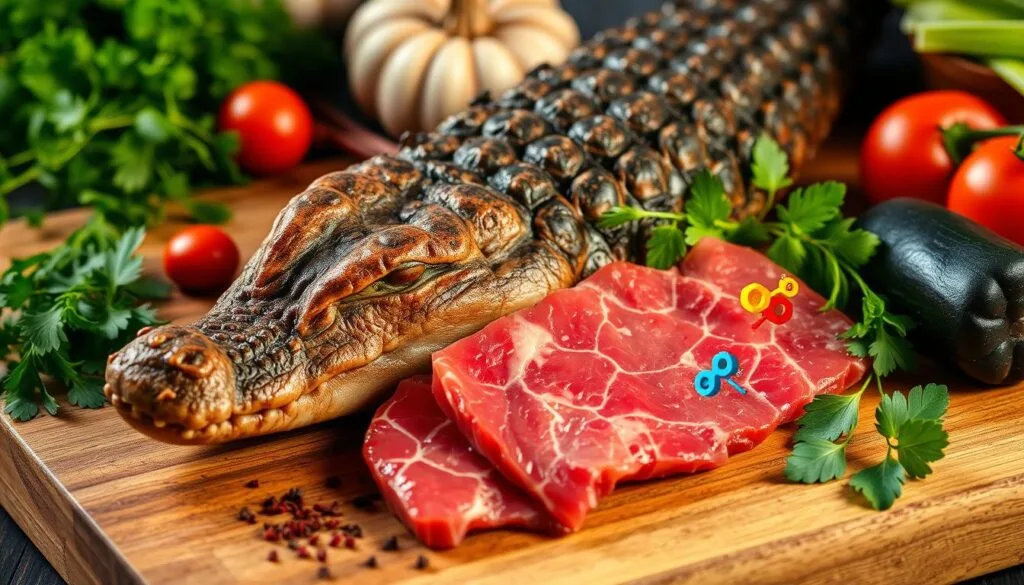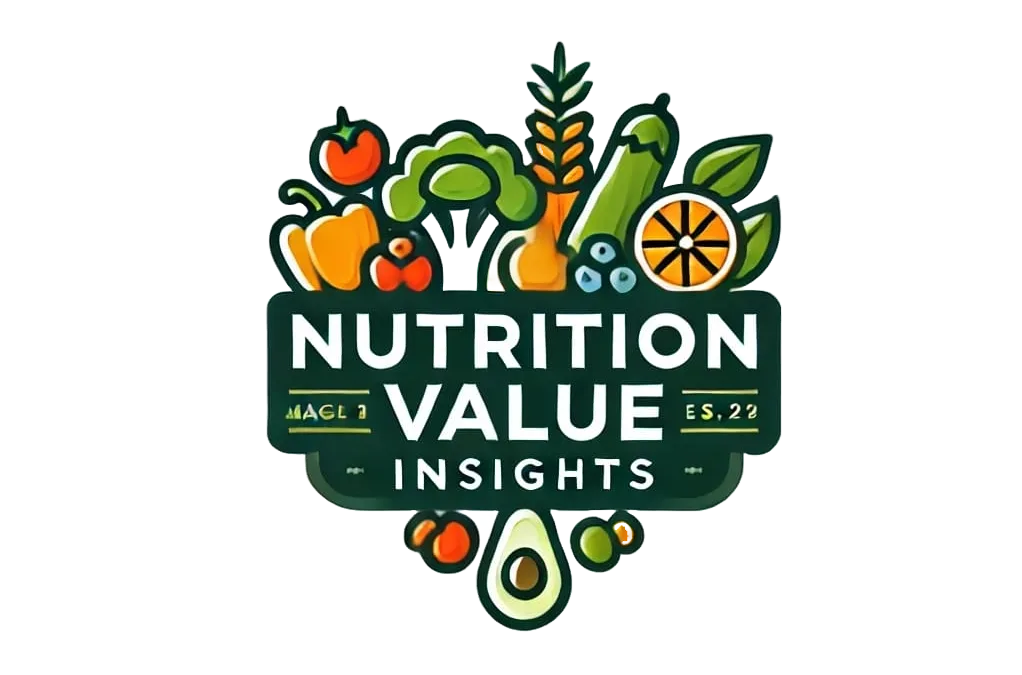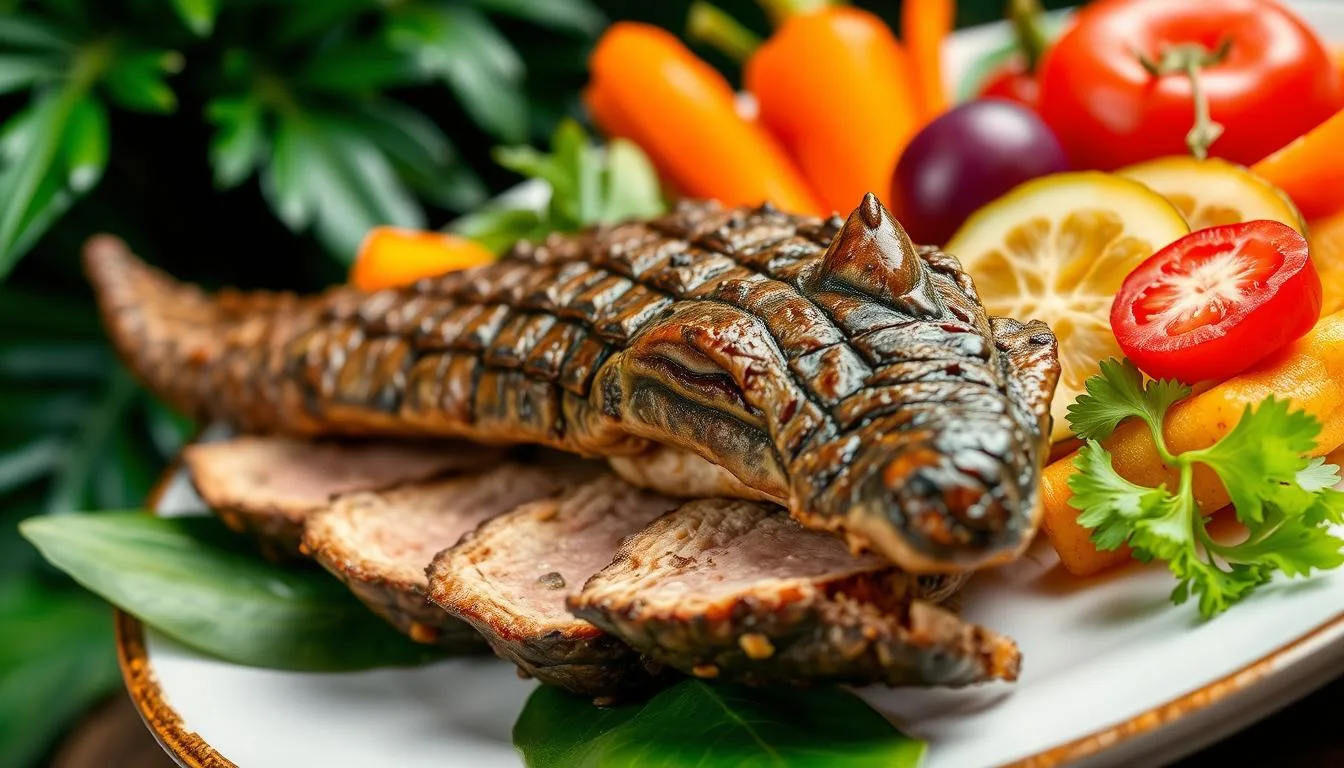Crocodile Meat Nutrition: A High-Protein, Low-Fat Exotic Delicacy
Crocodile meat nutrition value is becoming more popular as a healthy choice. It has a lot of protein and not much fat. It also has omega-3 fatty acids, potassium, and Vitamin B1.
Its taste is like a mix of chicken and fish. This makes crocodile meat a lean, healthy choice for those looking to try something new. It helps keep your diet balanced and nutritious.

Table of Contents
Introduction to Crocodile Meat Nutrition
Crocodile meat is becoming more popular in Western cuisine. It’s loved for its unique taste and health benefits. Once valued in Asia and Africa for its healing properties, it’s now enjoyed globally.
Rising Popularity in Western Cuisine
Crocodile meat’s popularity is growing because it’s versatile. Chefs and home cooks are trying different ways to cook it. They use marinades and spices to make it even tastier.
Cultural Significance and Traditional Uses
In some cultures, crocodile meat is seen as a health booster. It’s used in Chinese medicine for its healing powers. This has made people curious about trying it, looking for new food experiences.
Modern Culinary Applications
Today, chefs are getting creative with crocodile meat. They use it in everything from gumbo to fusion dishes. Its unique flavor is making it a hit in modern cooking.
Crocodile Meat Nutrition: Essential Components
Crocodile meat is packed with nutrients, making it a great choice for your diet. It’s high in protein and low in fat, unlike many other meats. It also has vitamins in crocodile meat like B12, niacin, and B1, helping with energy and health.
This meat is also rich in minerals like iron, potassium, and phosphorus. These minerals help with oxygen transport, muscle function, and bone health. Together, they make crocodile meat a nutrient-dense food.
Crocodile meat tastes like chicken but is firmer and sweeter. Its unique taste and texture make it a great choice for cooking. As more people try it, they discover its delicious and healthy qualities.
| Nutrient | Amount per 100g of Crocodile Meat |
|---|---|
| Protein | 26.7g |
| Vitamins in Crocodile Meat | Vitamin B12: 1.3μg Niacin: 4.6mg Vitamin B1: 0.1mg |
| Minerals | Iron: 1.7mg Potassium: 260mg Phosphorus: 200mg |
| Crocodile Meat Calories | 165 calories |
“Crocodile meat is a lean, nutrient-dense choice that can be a delicious and healthy addition to your diet.”
Adding crocodile meat to your meals can be a fun and healthy choice. It’s a great way to mix up your protein sources and enjoy a tasty, lean option. With its vitamins in crocodile meat and crocodile meat calories, it’s a nutritious choice for any diet.
Health Benefits and Therapeutic Properties
Crocodile meat is packed with health benefits, making it great for any diet. It’s full of protein and omega-3 fatty acids, boosting your immune system. The antioxidants in it fight free radicals, which can slow aging and improve skin health.
Immune System Support
Crocodile meat is a top protein source, key for a strong immune system. Its omega-3 fatty acids also help fight inflammation and boost immune cell activity.
Anti-aging Properties
Crocodile meat is loaded with antioxidants that fight free radicals. Eating this meat may help keep your skin healthy and slow aging signs.
Recovery and Healing Benefits
The protein and minerals in crocodile meat are great for recovery after illness or injury. They help repair tissues and muscles, and support overall healing.
Looking to boost your immune system, fight aging, or aid in recovery? Crocodile meat is a nutritious choice. Its unique benefits make it a standout in any balanced diet.
Protein Content and Amino Acid Profile
Crocodile meat is packed with high-quality protein. It has all the amino acids needed for muscle growth, repair, and body function. Its protein content is as good as, or even better than, chicken or beef. This makes it great for athletes and health enthusiasts looking to boost their protein intake.
Studies show that crocodile meat has at least 28.60% crude protein on a dry basis. This means 100 grams of crocodile meat gives you about 46 grams of protein. This is more than many other animal proteins.
| Nutrient | Value per 100g |
|---|---|
| Crude Protein | 28.60% (min) |
| Crude Fat | 14.30% (min) |
| Crude Fiber | 0.30% (max) |
The protein in crocodile meat is also complete with all essential amino acids. These are amino acids our bodies can’t make on their own. This makes crocodile meat a top choice for muscle building, repair, and keeping the body healthy.
For those looking for new protein sources or exotic meats, crocodile meat is a great choice. It’s nutritious and can be used in many different dishes.

Fat Content and Omega-3 Fatty Acids
Crocodile meat is known for its low fat content, especially saturated fat. This makes it a healthier choice than beef and pork. It’s also packed with omega-3 fatty acids, which are good for your heart and reduce inflammation.
Types of Healthy Fats Present
Crocodile meat has healthy fats like monounsaturated and polyunsaturated fatty acids. These fats are key for cell function and hormone balance. The omega-3s in crocodile meat, EPA and DHA, are especially good for your heart.
Comparison with Other Meat Sources
| Meat Source | Cholesterol (mg per 300g serving) | Saturated Fat (g per 300g serving) |
|---|---|---|
| Crocodile | 23-40 | 2.5-4.5 |
| Beef | 85-100 | 9-12 |
| Pork | 70-90 | 7-10 |
The table shows crocodile meat has less cholesterol and saturated fat than beef and pork. This makes it a better choice for your heart.
Heart Health Benefits
Crocodile meat is low in fat and cholesterol but high in omega-3s. Eating it can lower heart disease risk by reducing inflammation and improving blood fats. It’s a tasty way to get more omega-3 fatty acids and cut down on unhealthy fats.
Sourcing and Safety Considerations
Enjoying crocodile meat’s unique flavor and health benefits requires careful attention to safety and sustainability. It’s vital to buy from trusted suppliers to ensure quality and avoid health risks. This way, you can enjoy crocodile meat without worrying about foodborne illnesses or environmental harm.
Safe handling and cooking are crucial to avoid bacterial infections. Cook crocodile meat to at least 165°F (73.9°C) to kill harmful bacteria like Salmonella or E. coli.
Crocodile meat can cause allergic reactions, especially in people with seafood allergies. This is because of protein similarities. If you have a known food allergy, talk to a doctor before trying crocodile meat.
Sustainable Sourcing Practices
It’s important to support sustainable farming and hunting of crocodiles. This helps keep the environment balanced and protects wild crocodile populations. Many countries have laws to control the crocodile meat trade, following international standards like CITES.
Look for reputable crocodile farms that follow FDA guidelines and use the whole animal. They turn waste into fertilizers. Responsible hunting with set limits and reporting also helps maintain healthy crocodile numbers.
| Nutrient | Crocodile Meat (3.5 oz serving) | Beef (3.5 oz serving) |
|---|---|---|
| Protein | 46 g | 26 g |
| Fat | 3 g | 10 g |
| Calories | 110 | 208 |
By choosing responsible sources and following food safety tips, you can enjoy crocodile meat’s unique taste and health benefits. This supports sustainable practices and helps protect the environment.
Cooking Methods and Preparation Tips
Preparing crocodile meat needs special techniques to highlight its flavor and soft texture. Whether you’re a pro chef or a home cook, knowing the best ways to cook and prepare can make your dishes stand out.
Marinades and Seasonings
Marinating crocodile meat tenderizes it and adds tasty flavors. Mix citrus juices, vinegar, and herbs and spices. Use lemon, lime, or orange juice, garlic, rosemary, thyme, and a bit of soy sauce or Worcestershire sauce. Let it marinate for 30 minutes to a few hours before cooking.
Temperature and Timing Guidelines
Don’t overcook crocodile meat to avoid a tough texture. The ideal internal temperature for crocodile steak is 145°F (63°C) for medium-rare, or up to 160°F (71°C) for medium. Cooking time is key, as it quickly goes from tender to tough. Quick-cooking methods like grilling, pan-searing, or stir-frying are best to keep it moist and tender.
Best Cooking Techniques
- Grilling: Crocodile meat is perfect for grilling, as it creates a tasty char and caramelization while staying juicy inside.
- Frying: Pan-frying or shallow-frying crocodile meat gives a crispy outside and a tender inside. Use a high-heat-tolerant oil like avocado or grapeseed oil.
- Slow-Cooking: Slow-cooking crocodile meat in a braise, stew, or slow cooker makes it tender and flavorful. It breaks down connective tissues for a melt-in-your-mouth texture.
By mastering these cooking methods and preparation techniques, you can unlock the full potential of crocodile meat. This way, you can create delicious dishes that highlight its unique texture and flavor.
Environmental Impact and Sustainability
The demand for exotic meats like crocodile is growing. It’s important to think about the environmental impact of crocodile farming. Luckily, regulated farms help meet this demand without harming wild crocodiles.
Well-managed crocodile farms follow strict rules to protect the species. But, bad farms can pollute and harm local ecosystems. Wild hunting is even worse, threatening conservation efforts. So, it’s key to pick crocodile meat from sustainable sources.
In Australia, saltwater crocodiles are farmed for their skins and meat. Farms use different housing types for crocodiles at different stages. Research shows that crocodiles in individual pens behave differently than those in groups. Group pens can lead to more skin damage due to fighting.
Regulatory bodies have set rules to make crocodile farming sustainable. Laws like the Territory Parks and Wildlife Conservation Act 1976 and the Animal Protection Act 2018 help. There’s also a Wildlife Trade Management Plan for Northern Territory Crocodile Farming 2021-25.
By choosing sustainably sourced crocodile meat, we support conservation and responsible farming. This is vital for the future of this unique food.

“Crocodile farming has become a popular method to meet demand while minimizing impact on wild populations.”
Conclusion
Crocodile meat is a nutritious and versatile choice for health-conscious people. It has high-quality protein and low fat, making it a great alternative to regular meat. It also supports the immune system and has anti-aging properties.
The popularity of crocodile meat is growing in Western cuisine. It’s important to source it responsibly and think about its environmental impact. Sustainable farming practices help keep this exotic delicacy available while protecting the ecosystem.
Overall, crocodile meat is a great choice for those looking to try new foods and eat healthily. It’s perfect for gourmet dishes or as a main course. It offers a unique and satisfying dining experience that meets your health and taste preferences.
FAQ
What are the nutritional benefits of crocodile meat?
Crocodile meat is packed with nutrients. It’s rich in protein and has essential amino acids. It also has omega-3 fatty acids and vitamins like B12, niacin, and B1.
How does the protein content of crocodile meat compare to other meats?
Crocodile meat is a top-notch protein source. It has all the amino acids needed for muscles and body repair. Its protein is as good as, or even better than, chicken or beef.
Is crocodile meat low in fat and cholesterol?
Yes, it’s low in fat, especially saturated fat. This makes it a good choice for your heart. It also has omega-3s and less cholesterol than beef and pork.
What are the health benefits of consuming crocodile meat?
Eating crocodile meat boosts your immune system. It’s full of protein and omega-3s. It also has antioxidants that can slow aging and help with recovery.
How should crocodile meat be sourced and prepared?
Buy crocodile meat from trusted suppliers for safety and quality. Use proper handling and cooking to avoid sickness. Try marinating, grilling, frying, or slow-cooking for flavor and tenderness.
What are the environmental considerations for consuming crocodile meat?
Choose sustainable farming for crocodile meat to protect wild populations and ecosystems. Bad farming can pollute and harm nature. So, pick responsibly sourced meat.
DID OUR INFORMATION HELP YOU ?
There are no reviews yet. Be the first one to write one.

